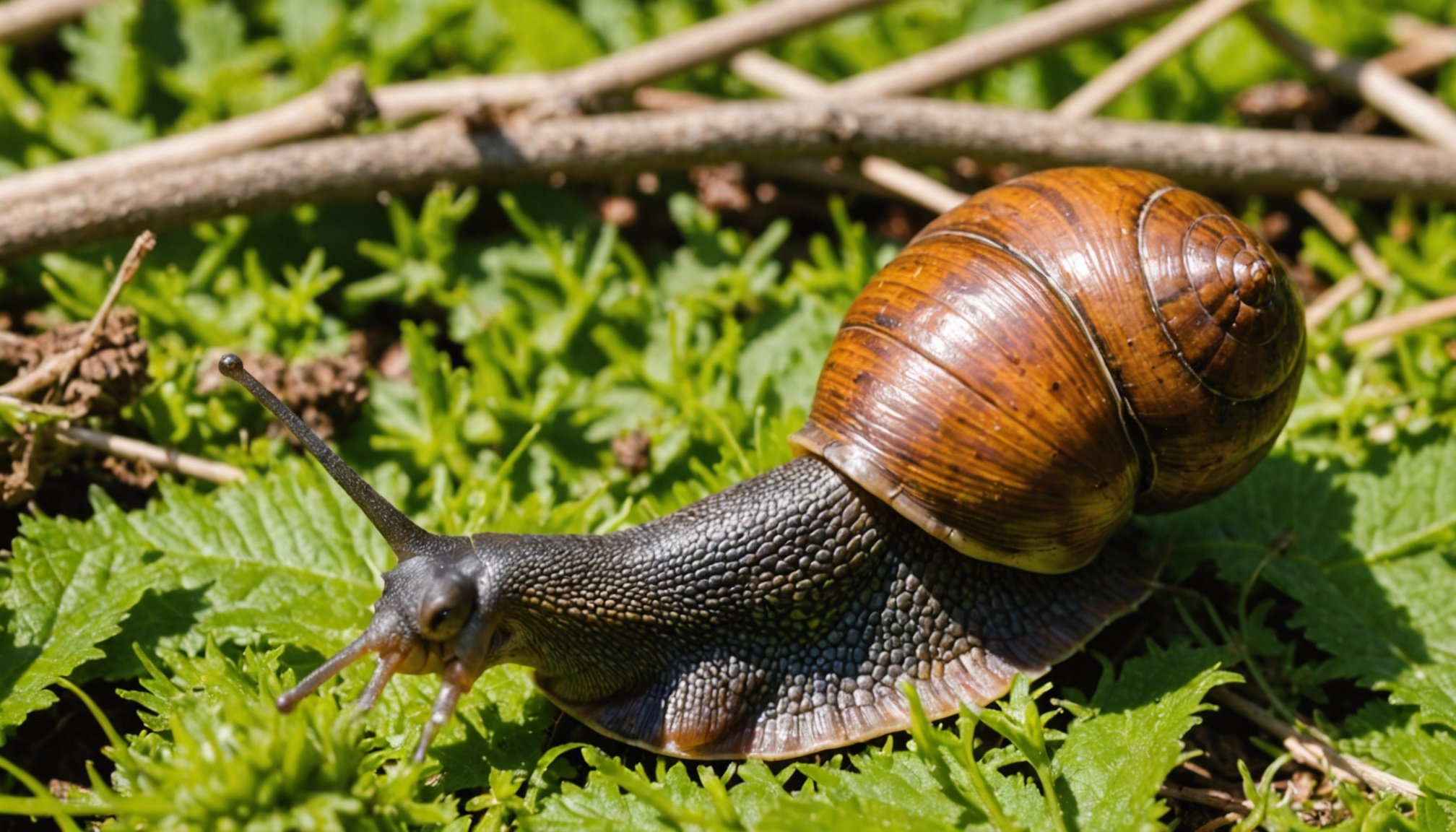Introduction to Organic Snail Control
Snails can be a persistent nuisance in UK gardens, causing significant damage to a wide variety of plants. These slimy pests thrive in moist environments and can quickly multiply, making it challenging for gardeners to keep plant beds healthy and intact. With their voracious appetites, snails chew through leaves and stems, leaving a trail of destruction in their wake.
Adopting eco-friendly pest control methods is not only beneficial for the environment but also crucial for maintaining a balanced ecosystem. Organic snail control strategies are becoming increasingly popular among gardeners who wish to avoid harmful chemicals. Such strategies ensure that beneficial insects and the overall soil health remain unharmed, which ultimately leads to more robust plant growth.
Also to discover : Ultimate Guide to Thriving Tomato Cultivation in Your UK Conservatory
Organic snail control has additional benefits—it promotes a healthier gardening practice overall. By incorporating natural methods, gardeners can produce a chemical-free space for growing fruits and vegetables, contributing to improved human health. Some popular methods include introducing natural predators like hedgehogs or frogs, using copper barriers as deterrents, or applying biodegradable slug pellets.
Understanding the importance of going organic is essential to fostering a sustainable gardening routine, ensuring your garden thrives while maintaining biodiversity and safeguarding the environment.
Also read : Top Organic Strategies for Managing Weeds in Your UK Gravel Pathway
Natural Repellents for Snail Management
Finding efficient snail repellents that align with the principles of organic pest control is essential for maintaining a thriving garden. Let’s delve into several solutions that are both effective and eco-friendly.
Salt and Diatomaceous Earth
Two common and accessible agents are salt and diatomaceous earth, which prove effective in creating physical barriers against snails. Applying salt directly to snails can dehydrate these pests but may also adversely affect soil health, so it’s crucial to use sparingly. Alternatively, diatomaceous earth, sprinkled around plants, acts as a physical deterrent. Its abrasive texture harms snails without impacting plant life, making it an excellent option for organic pest control.
Essential Oils and Natural Sprays
Essential oils, such as peppermint and eucalyptus, can naturally repel snails without causing harm to plants. These oils can be mixed with water to create a potent spray. When applied to soil and plant leaves, they form an aromatic barrier that discourages snails from venturing too close.
Homemade Garlic and Pepper Solutions
Creating your own snail repellents, such as garlic and pepper solutions, integrates common kitchen ingredients into your organic pest control strategy. By blending garlic or hot pepper with water and a touch of soap, you can produce a natural spray. This solution, when applied around plant bases, deters snails effectively while maintaining a chemical-free garden environment.
Companion Planting Techniques
Companion planting is a technique that uses nature’s synergy to enhance garden health and productivity. Selecting pest-resistant plants can naturally deter snails, safeguarding your beloved greens without harsh chemicals.
One way to reduce snail populations is to introduce plants that actively repel or confuse these pests. For instance, aromatic herbs such as rosemary, thyme, and mint are known to deter snails. Additionally, fennel, garlic, and certain types of marigolds can create a less welcoming environment for these creatures. These plants either produce scents that snails dislike or release compounds toxic only to them.
By strategically arranging companion plants, gardeners can disrupt the typical habitats and pathways snails prefer, thus reducing damage effectively. When planning your garden, position pest-resistant plants near susceptible species. This arrangement not only shields delicate plants but also helps maintain soil moisture and nutrients through diverse root systems interacting positively.
It’s crucial to maintain plant diversity and understand each species’ role. Mixing repellent plants with those snails love, such as lettuce or hostas, can form a natural barrier, with minimal effort on your part. By leveraging these techniques, you can keep your garden flourishing and snail-free organically.
Habitat Modification Strategies
In the quest for effective snail prevention, garden layout plays a crucial role. A well-planned garden layout can greatly reduce the attractiveness of your outdoor space to these pesky invaders. One simple yet impactful strategy is maintaining garden cleanliness. By clearing away debris, fallen leaves, and other garden clutter, you minimise potential hiding spots for snails. Less shelter means snails have fewer places to thrive, resulting in a gradual decline in their population.
Focusing on soil drainage is another effective strategy. Ensuring your garden has good drainage aids in reducing excess moisture, which snails desperately need. You can achieve this by amending the soil with organic materials, using raised beds or designing slopes to facilitate water run-off. A drier environment will discourage these moisture-dependent creatures.
Designing your garden to be less appealing to snails involves thoughtful planning. Consider planting snail-resistant varieties known for their less enticing texture or scent. Incorporate gravel or rough surfaces around plant bases, creating unfavourable pathways for snails. Ensuring plant spacing allows for easy airflow and sunlight exposure can further dry out the soil, combining aesthetics with practicality in your garden layout. Ultimately, these strategies harmonize aesthetics with functionality, making your garden a delightful and snail-free oasis.
Utilizing Beneficial Organisms
A garden’s ecosystem thrives when balance is maintained, and beneficial insects and natural predators play a crucial role in this harmony. By understanding and harnessing these ecological allies, gardeners can effectively manage unwanted pests.
Introducing Predatory Snails
Certain snail species, often overlooked, can serve as natural predators to more destructive snails. These predatory snails, such as the decollate snail, actively hunt common plant-damaging snails and slugs, reducing their population. Introducing these snails needs to be controlled and informed, ensuring they do not disrupt the habitat balance.
Attracting Birds and Other Wildlife
Birds, particularly those fond of insects and snails, are natural cleaners of the garden. Encouraging their presence by providing nesting sites and water sources can significantly reduce pest numbers. Diverse vegetation and seed feeders can attract a variety of bird species, enhancing ecological diversity and control.
Encouraging Beneficial Insects
Insects like ladybugs, ground beetles, and parasitoid wasps are stalwarts in pest management. These insects target different stages of snail development, from eggs to adults. Cultivating a garden that includes pollen and nectar-rich plants helps invite these beneficial bugs. Simple strategies such as minimizing insecticide use and planting diverse flora can sustain their populations, promoting a healthy garden ecosystem.
Testimonials and Case Studies
To explore successful organic snail control, let’s delve into gardening success stories across the UK. Many green-thumbed enthusiasts have taken to sharing their testimonials on innovative, natural methods effectively warding off these slimy invaders.
Snail control is no small feat, but a notable success comes from an allotment owner in Devon who managed to reduce snail disruption significantly through the use of homemade garlic oil spray. This technique, backed by numerous other testimonials, yielded impressive results by deterring snails with a solution containing potent aromas they dislike.
Additionally, a case study in Yorkshire focused on utilising beer traps, which has given rise to similar reports of success. The gardeners strategically placed traps around key areas, observing a notably diminished snail population over the months.
These organic strategies demonstrate not only immediate reduction in pest presence but also long-term benefits, enhancing garden health. By avoiding chemical interventions, such methods preserve the biodiversity necessary for thriving gardens. Gardeners consistently report a marked improvement in their garden’s resilience and vitality.
Thus, while snail control testimonials abound with creative, organic solutions, they reinforce an encouraging trend towards sustainable gardening practices contributing to ecosystem balance. The power of shared knowledge continues to inspire and guide others toward their own organic gardening triumphs.
Tips for UK-Specific Considerations
Navigating the UK garden conditions presents unique challenges, especially when dealing with snails. The ever-changing UK climate significantly influences these creatures’ behaviour. Wet weather, common in regions from Scotland to Wales, creates perfect conditions for snails. These molluscs thrive in moist environments, leading to increased activity post-rainfall.
Impact of Climate and Soil on Snail Behaviour
UK soils, generally clay-heavy and rich, offer snails an ideal habitat. Snails prefer such soils as they retain moisture well. Certain areas, however, like the chalky soils in the South Downs, may naturally discourage snail populations due to their drainage properties.
Timing and Frequency of Treatments
Treatments should align with seasonal changes. In early spring, with rising temperatures, snails emerge en masse. Implement pest control measures bi-weekly at this stage to weaken their presence. As summer approaches and weather dries, monthly treatments often suffice.
Regional Pest Control and Plant Selection
Incorporating culturally relevant plants such as lavender, rosemary, and mint can effectively deter snails. These plants thrive in the UK’s diverse regional climates while simultaneously acting as natural repellents. Their aromatic oils disrupt snail behaviour, offering a sustainable and visually pleasing solution to pest control.











